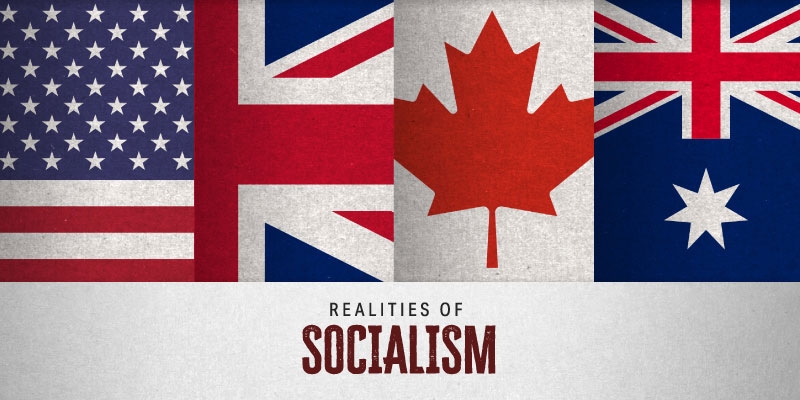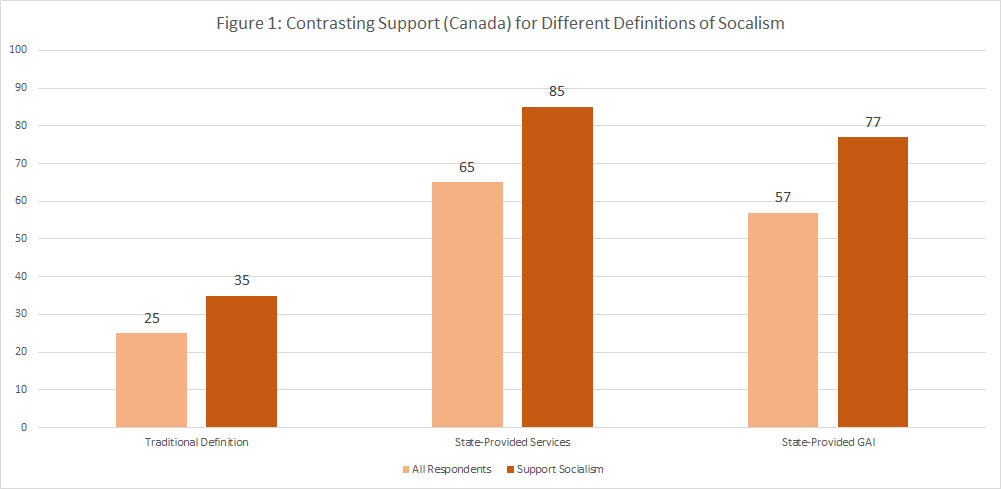Socialism definitions and tax increases: all respondents vs. socialism supporters

One of the interesting insights from the recent poll on the perceptions and views on socialism in Canada, the United States, Australia and the United Kingdom are the differences between all respondents and those who support socialism. This blog post summarizes those differences and highlights some important findings.
Table 1 summarizes the differences between the two groups for the questions related to how respondents defined socialism, as well as support for different tax increases to finance socialism. Figures 1 and 2 depict the results for Canada only, though the differences are comparable across all four countries.
In terms of how respondents defined socialism, it’s clear from the data in Table 1 (below) that those supportive of socialism had a higher level of support for socialism defined by its traditional meaning; specifically that the state owns the means of production. In other words, supporters of socialism had a higher level of support for defining socialism (35 per cent) as the government owning firms and industries to control and direct the economy compared to all respondents (25 per cent). However, only respondents in the U.S. and U.K. favouring socialism had support levels for the traditional definition above 50 per cent, while Canada had the lowest level of support among respondents supporting socialism at 35 per cent.
| Canada | U.S. | Australia | U.K. | |||||
|---|---|---|---|---|---|---|---|---|
| All Respondents | Support Socialism | All Respondents | Support Socialism | All Respondents | Support Socialism | All Respondents | Support Socialism | |
| Traditional Definition | 25 | 35 | 32 | 53 | 35 | 49 | 39 | 56 |
| State-Provided Services | 65 | 85 | 58 | 85 | 65 | 84 | 55 | 76 |
| State-Provided GAI | 57 | 77 | 47 | 69 | 57 | 75 | 57 | 75 |
| Wealth Tax on Top 1% | 72 | 88 | 66 | 85 | 72 | 83 | 70 | 82 |
| Higher PIT for Top 10% | 59 | 75 | 54 | 73 | 54 | 66 | 53 | 71 |
| Higher PIT for Most Citizens | 31 | 46 | 37 | 64 | 39 | 50 | 37 | 52 |
| Higher/New 20% VAT | 16 | 22 | 29 | 49 | 23 | 34 | 23 | 35 |
Moreover, similar to the results for all respondents, supporters of socialism favoured non-traditional definitions by wide margins. Specifically, there were much higher levels of support for socialism defined as the government providing more services and the government providing a guaranteed annual income compared to the traditional definition of socialism discussed above. In Canada, for instance, supporters of socialism favoured government-provided services (85 per cent) and the government providing a guaranteed annual income (77 per cent) compared to just 35 per cent favouring the traditional definition of socialism (see Figure 1 below).

Put simply, while the relative levels of support for different definitions of socialism are higher for respondents indicating their preference for socialism, the general results are comparable to those for all respondents—support for the traditional definition of socialism is comparatively weak compared to the much higher levels of support for socialism defined as the government providing services and the government providing a guaranteed annual income.
The second set of data in Table 1 relates to the contrasting results for the four tax options provided in the poll linked with paying for socialism. Specifically, the poll asked respondents for their support or lack thereof for four different tax increases to pay for socialism: (1) a new wealth tax imposed on the top 1 per cent, (2) higher personal income taxes (PIT) applied to the top 10 per cent, (3) higher personal income taxes for most citizens, and (4) a higher/new national sales tax (roughly 20 per cent).
As the data in Table 1 show for all four countries, as well as the data specifically for Canada in Figures 1 and 2, respondents supportive of socialism are generally more supportive of all four tax increase options. Indeed, support for higher taxes in all four countries for all four tax options was higher for those supportive of socialism than for all respondents (see Table 1).
However, the insight from the data regarding a preference for someone else to pay for socialism remains. Comparable to the responses from all respondents, supporters of socialism have a strong preference for a narrow tax increase such as a new wealth tax on the top 1 per cent and/or higher personal income taxes for the top 10 per cent compared to their support for broad tax increases (higher personal income taxes for most citizens and/or a new/higher national sales tax). Consider the Canadian data in Figure 2 (below) where 88 per cent of respondents supportive of socialism support a new wealth tax on the top 1 per cent versus just 22 per cent favouring a higher GST. Clearly, supporters of socialism are similar to the all respondents in that they generally do not want to incur higher taxes themselves to pay for socialism.

The data for supporters of socialism compared to the results for all respondent is important because while respondents favouring socialism express higher levels of support for alternative definitions of socialism and the narrowly focused tax increases needed to pay for them, the general results are similar across the entire sample of respondents. Supporters of socialism, like all respondents, tend to favour a new type of socialism characterized by the government providing more services and/or a guaranteed annual income, while they generally do not favour higher taxes broadly applied. Rather, they favour targeted tax increases on the very wealthy that are unlikely to affect them.

